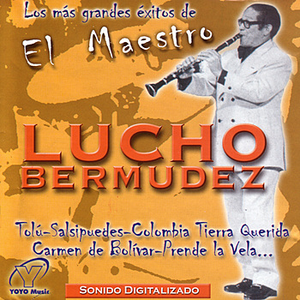In the feverish activity during six decades of the twentieth century, Lucho… Read Full Bio ↴In the feverish activity during six decades of the twentieth century, Lucho Bermúdez got to compose 1000 songs, many of them recorded on 80 long play records. He dedicated his 'Porro Carmen de Bolívar' to his hometown, which turned into an anthem in the voice of his wife, Matilde Díaz. His group, "Orquesta de Lucho Bermúdez", went all over Colombia (his native country), first as a group of important radio stations and then as an invited orchestra to clubs, hotels, grills, carnivals and fairs. The clarinet played by Lucho was the pattern for the good tone in porros, gaitas, cumbias, boleros and pasillos, which caused furor. Even though it is not widely known, his artistic production started with tunes of the interior region. Bambucos, torbellinos, guabinas and sanjuaneros, are then in his compendium.
He was born in 1912 and died in 1994 in Bogotá. At an early age he learned to play the piccolo, pipe organ, trumpet, stick trombone, saxophone, and clarinet. 'Marbella', 'Cadetes Navales', 'Calamarí', 'Prende la Vela', 'Las Mujeres de San Diego', 'Joselito Carnaval', 'Borrachera', 'El Veneno de los Hombres', 'Danza Negra', 'San Fernando', 'Salsipuedes', 'Linda Caleñita', 'Los Primos Sánchez' and 'Gaita De Las Flores' are some of his most famous compositions. On June 13, 1954, the day of inauguration of Colombian television, Lucho Bermúdez acted in the first transmission. In 1968 he released a new rhythm and dance called Patacumbia. Months before dying in Bogotá, the liberal leader Jorge Eliécer Gaitán had made the following prediction to Lucho Bermúdez: "Your music will be like me: everybody will love it".
He was born in 1912 and died in 1994 in Bogotá. At an early age he learned to play the piccolo, pipe organ, trumpet, stick trombone, saxophone, and clarinet. 'Marbella', 'Cadetes Navales', 'Calamarí', 'Prende la Vela', 'Las Mujeres de San Diego', 'Joselito Carnaval', 'Borrachera', 'El Veneno de los Hombres', 'Danza Negra', 'San Fernando', 'Salsipuedes', 'Linda Caleñita', 'Los Primos Sánchez' and 'Gaita De Las Flores' are some of his most famous compositions. On June 13, 1954, the day of inauguration of Colombian television, Lucho Bermúdez acted in the first transmission. In 1968 he released a new rhythm and dance called Patacumbia. Months before dying in Bogotá, the liberal leader Jorge Eliécer Gaitán had made the following prediction to Lucho Bermúdez: "Your music will be like me: everybody will love it".
Gloria Maria
Lucho Bermúdez Lyrics
We have lyrics for 'Gloria Maria' by these artists:
Jonny Pasos Gloria María, Gloria María Porque tú eres mi querer y Dios…
We have lyrics for these tracks by Lucho Bermúdez:
Arroz con Coco Arroz con coco Alla en la costa me vuelve loco Yo quiero…
Carmen de Bolívar Carmen querido, tierra de amores hay luz y ensueños bajo tu…
Colombia Tierra Querida Colombia tierra querida himno de fe y armonia Cantemos, can…
Danza Negra Con el rumor de las palmeras Se siente el eco de…
Indiferencia No sé porque me esquivas Sabiendo que te quiero No se porque…
La Danza Negra Con el rumor de las palmeras Se siente el eco de…
Salsipuedes Hoy quiero gozar, quiero vivir en Salsipuedes, tierra de ilu…
San Fernando San, San, San Fernando San, San, San Fernando San, San, San …
Tambores de Chambacú Tambores de Chambacú Tambores de Chambacú Chambacú Vengo co…
The lyrics are frequently found in the comments by searching or by filtering for lyric videos
More Genres
No Artists Found
More Artists
Load All
No Albums Found
More Albums
Load All
No Tracks Found
Genre not found
Artist not found
Album not found
Search results not found
Song not found
